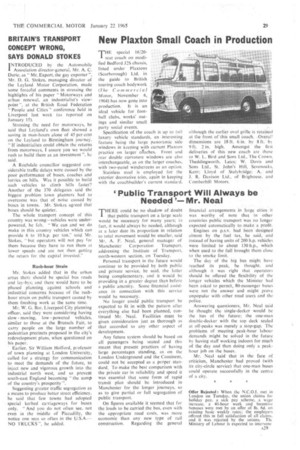Public Transport Will Always be Needed Mr. Neal
Page 31

If you've noticed an error in this article please click here to report it so we can fix it.
THERE could be no shadow of doubt 1 that public transport on a large scale would be necessary for many years; in
fact, it would always be needed, although at a later date its proportion in relation to total movement would be smaller, said Mr. A. F. Neal, general manager of Manchester Corporation Transport, addressing the Institute of Transport, north-western section, on Tuesday.
Personal transport in the future would continue to be provided by both public and private service, he said, the latter being complementary, and it would be providing in a greater degree than before
a public amenity. Some financial assistance in connection with this service would be necessary.
No longer could public transport be expected to fit in with the pattern after everything else had been planned, continued Mr. Neal. Facilities must be given consideration just as thorough as that accorded to any other aspect of development.
Any future system should be based on all passengers being seated and this meant that present practices of having large percentages standing, as on the London Underground and the Continent, could not be accepted as a proper stan dard. To make the best comparison with the private car in reliability and speed it was essential that some form of rapid transit plan should be introduced in Manchester for the longer journeys, so as to give partial or full segregation of public transport.
On figures available it seemed that for the loads to be carried the bus, even with the appropriate road costs, was more economic than any new type of rail construction. Regarding• the general financial arrangements in large cities. it was worthy of note that in other countries public transport was no longer expected automatically to make a profit.
Engines on p.s.v. had been designed almost by the fuel tax, he said, and instead of having units of 200 h.p. vehicles were limited to about 130 h.p., which when used to the full brought them close to the smoke limit.
The day of the big bus might have reached its peak, he thought, and although it was right that operators should be offered the flexibility of the longer vehicles which the Minister had been asked to permit, 80-passenger buses were not the answer and might prove unpopular with other road users and the police.
Answering questioners. Mr. Neal said he thought the single-decker would be the bus of the future; the one-man double-decker with the top deck sealed at off-peaks was merely a stop-gap. The problems of meeting peak-hour labour demands might be solved in the future by having staff working indoors for Much of the day and then doing only a peak' hour job on the buses.
Mr. Neal said that in the face of criticism, Manchester had proved (with its city-circle service) that one-man buses could operate successfully in the centre of a city.




















































































































